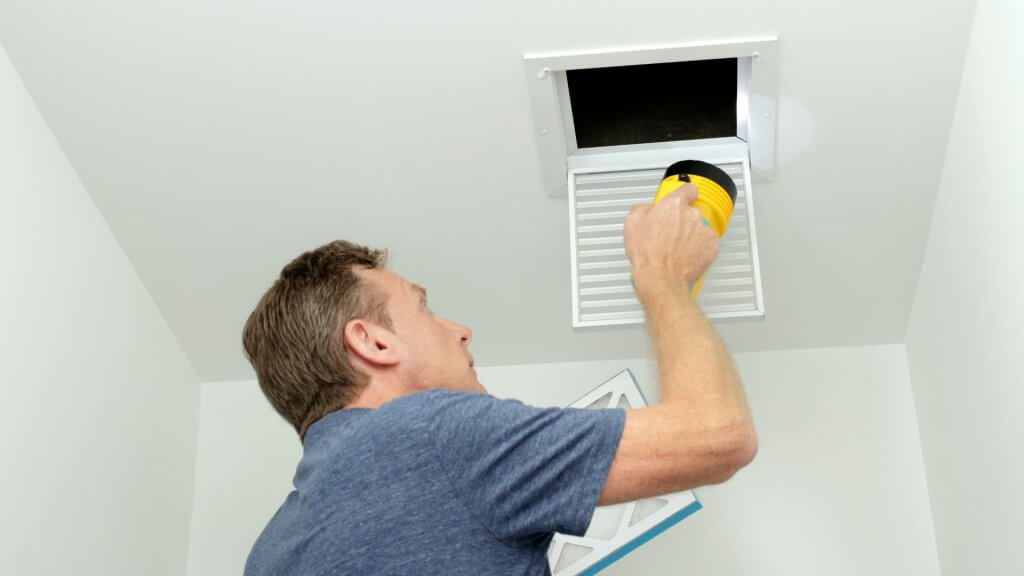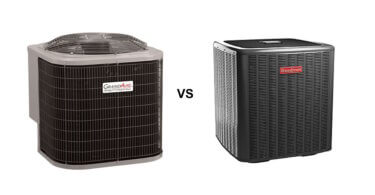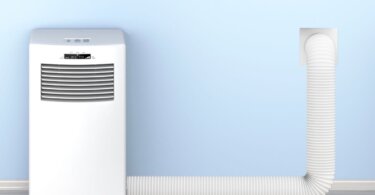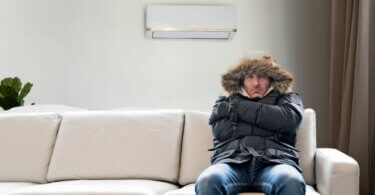HVAC units are a must-have no matter where you live. They save you from the blazing sun in the summers, and the freezing cold in the winters. HVAC maintenance is essential to enjoy your system for a longer period of time.
Because being used all around the year means your HVAC system can experience a little wear and tear. However, if it is not taken care of in time, these small issues can turn into much bigger inconveniences down the line.
Over time, your HVAC unit can become strained and may collect dirt and debris. Without proper maintenance, the system will circulate old, stale air, putting the health of your family in danger (source).
To stop this from happening, use the following guide to find out how to maintain your HVAC unit, so it doesn’t end up costing you.

Is HVAC Maintenance Neccessary?
Just like any other appliance in your home, your HVAC system also needs to be maintained from time to time. Doing this ensures your heating and cooling systems run efficiently throughout the year and beyond.
You must have heard the good old saying “A stitch in time saves nine”. Well, it couldn’t be any more true for your heating, ventilation, and air conditioning (HVAC) system. Most of us forget to take care of it or worse; we ignore the problem until it becomes too big to handle ourselves. At which point you have to call in a professional to fix the issues. And that, of course, comes with a hefty price tag.
For best performance and working, be regular with your maintenance checks. Thus, you can tackle any problems before they become a nuisance.
When Does Your HVAC System Need Maintenance?
When was the last time you got your HVAC system serviced? If it was too long ago, you better look for these five tell-tale signs that suggest the system needs some help:
Blocked Vents

Picture this – as the temperature has started to soar, you go to turn on your AC, expecting it to let out a cool breeze. Instead, you find your air condition unit barely has any airflow at all.
If that’s you, then you probably have got some clogged vents on your hands.
It doesn’t take long for dirt to build up inside the HVAC system. This causes a host of problems from blocked fan units to dust-filled air filters. And it impacts each component, hindering the overall efficiency of the system.
Unusual Spike In Electric Bill
If the charges on your electric bill are higher than normal, it’s time to call in an expert for repairs.
It is normal for your bill to go up when the temperature rises or falls. But a consistently high or increasing energy bill is an indication of your HVAC system acting inefficiently.
Leakage In Refrigerant Lines
Does it feel like your heater or air conditioner has been running the entire day, but it is still not doing its job?
This can be a sign of leaked connectors and refrigerant lines. Some parts of the HVAC system are more prone to leakage than others and may get damaged quite easily.
Refrigerant lines that form the main connection between your home and the outdoor HVAC unit can sometimes start leaking because of wear. The cool or warm air keeps escaping from the pipes due to the damage. Because of this, the system has to work harder, yet it only performs mediocre.
Recurring Issues
Another issue people commonly face contains small problems that seem to solve on their own, only to show up again sometime later. The solution: small adjustments and repair work to fix the underlying issue.
However, if your HVAC unit has too many recurring problems, you might be better off buying a new one; repairing it may not be worth it.
Noisy HVAC System
Is your heater or air conditioner making too much noise? Don’t ignore it.
Aside from it being annoying, strange sounds and rattling noises coming out of the vents can be a cause for concern. This may mean you are in need of some repairs. So, the next time you think your HVAC system sounds a little weird, you must get it looked at by a qualified technician to sort things out.
How Important Is HVAC Maintenance?
HVAC systems don’t come cheap; their price can range anywhere from $8,000 to over $15,000. Since these units can cost you an arm and a leg, it is best to keep them in good health all year round. To find out just how necessary HVAC maintenance can be, let’s look at some of its top benefits:
1) Increased Lifespan
If you are a car enthusiast, you probably spend ample time every month making sure your car is in tip-top shape at all times. That’s because you want it to last for as long as it can.
In much the same way, HVAC maintenance can drastically improve the life of your home heating and cooling systems. It’s said that preventative maintenance can bring down the cost of repairs by almost 95%. With good care and looking after, your HVAC system won’t need any major repairs for a long time.
2) Energy Savings
Who doesn’t love it when their electric bill is lower than expected?
It’s the kind of surprise everyone wants.
That’s why you should never skip on regular maintenance checks. They can help you make savings of 5% to 40% on your electric bill.
3) Cleaner And Fresher Air
Dust is everywhere. No matter what we do, we can’t simply avoid it.
When this fine dust settles into the HVAC system in and around your home, it can cause many health problems; especially for those with health issues such as asthma. However, dust isn’t the only thing that builds up in dirty pipes and filters.
Many microbes and chemical pollutants also lurk in the improperly filtered air in your home such as mold, bacteria, cigarette smoke, and pet dander. The United States Environmental Protection Agency (EPA) states that the level of air pollutants inside our homes is 2 to 5 times higher than that in open spaces. That means, even if you don’t have any allergies now, you might develop them due to constant exposure to all the harmful chemicals in the air.
HVAC maintenance ensures all the pipes, vents, filters, and ducts around your home are free from this dust and harmful particles for good.
Related article: How Long Does Pet Dander Stay In a House
4) Avoid Carbon Monoxide Poisoning
Since heating systems use fuel, therefore, they come with a risk of leaking carbon monoxide into your home. This gas has no smell or fumes, so there is no way you can tell if your home is affected.
This is extremely dangerous, as carbon monoxide can cause serious damage to your health, even in small quantities. Preventative checks for HVAC systems always include tests to check the level of the toxic gas in the air. Hence, with maintenance, you can protect yourself and your family from suffering.
5) Greater Quality Of Life
It is very frustrating when your heating or cooling appliances keep turning off and on during peak summers and winters.
What’s the point of having an HVAC system if it doesn’t work for you when you need it the most?
Recurring HVAC maintenance can be greatly helpful in avoiding such unpleasant experiences. When all the systems are running as they should, it won’t only make your home cooler or warmer. Rather it will improve your quality of life and give you the peace of mind you deserve.
How Often Is HVAC Maintenance Needed?

The short answer to this is ‘whenever you use your HVAC system.”
Really, if you are using it and haven’t scheduled a maintenance check-up in a while, then you need to pick up the phone and make an appointment. Get the system looked at before you run into trouble.
But besides this, there are two more times during the year that call for preventative HVAC maintenance.
Every 3 to 6 months: It is mandatory to have your air conditioner looked at prior to the summer season; meaning during autumn. While the heating systems have to be checked in spring before the winter starts.
The more you use your HVAC system, the more it needs to be taken care of. For individuals running a heat pump system, you will require bi-yearly checkups for your system that works all days of the year.
Once a year: If you own a standard air conditioner and a furnace unit, yearly maintenance will be enough for either of the two.
Tips On How To Do Preventative HVAC Maintenance At Home
We have discussed a lot about how regular HVAC maintenance can improve the heating and cooling operation of your appliances. While getting repair work done by experts can oftentimes become a necessity, there are plenty of ways you can help maintain the quality of your home HVAC system.
Below you will find the best tips to ensure top functioning and operating efficiency of your HVAC system, without outside help:
1) Cleanup The Outdoor Unit
Central air conditioners always come with an outdoor condenser unit with a fan on top. Being outside, these units can collect dust, twigs, leaves, and whatnot. These need to be cleared off before they can start clogging the fan blades due to build-up.
You can easily clean this part of the unit with a little water. However, don’t use pressure washers as they can cause damage to the fan blades.
Also, while you’re at it, check the blades for any sign of damage and ensure they are running smoothly.
2) Replace Filters
You would be horrified to know how much dirt and debris your system’s filters can collect in a short time. For good air quality, buy new filters every couple of months to have only clean air circulating in your home.
Furthermore, high-quality filters will also help you save some dollars on your electric bill. Basically, it’s a win-win situation.
3) Unclog Pipes
Drainpipes can quickly become the hub of mold and algae if they aren’t unclogged in time. To overcome this issue, add some bleach to a small bucket of water, and flush it down the system’s pipes. This will help you clear up any blockage.
If you’re unsure where the drain pipes of your HVAC system are, just ask your local technician and they’ll help you out.
4) Cut Water Supply To Humidifier During Summers
Most people forget to turn off the water supply to the furnace humidifier during the summer months. There is no point in letting the humidifier work when you aren’t using it. So, the next time you turn off the furnace, make sure to also cut off the water supply.
5) Check Carbon Monoxide Levels
Carbon monoxide poisoning can be fatal if inhaled, even in small amounts. Since it’s undetectable, it is a good idea to install a carbon monoxide detector in your home as a preventative measure.
If you already have one, make sure to replace its batteries every few months to be certain it’s actually working.
Related article: 6 Best Air Quality Monitors – Buyers’ Guide & Review
Inspect Refrigerant Lines
Any damage to the refrigerant lines doesn’t only affect the temperature in your home but also the general efficiency of your HVAC system. And to make matters worse, it will also pile up charges on your energy bill.
Check these lines as often as you can or at least once every month to make sure they remain damage-free.
Conclusion
Hence, it is quite clear that for the proper functioning of your system, regular and preventative HVAC maintenance is a must. It’s common for people to forget and ignore maintaining their heating and cooling appliances until things get out of hand.
Don’t procrastinate! Instead, be proactive in dealing with all your HVAC routine checks.
This way you can avoid having to deal with any unpredictable heating and cooling system breakdowns during the steaming hot summer days or chilly winter nights. Also, good care and preventative maintenance guarantee you more than just efficient functioning.
You can save on your energy bill and also extend the life of your system; meaning you won’t have to replace the HVAC unit any time soon. That’s thousands of bucks in savings!
So, if you haven’t had any HVAC maintenance done in a while, maybe right now is a good time to look into it.
Related articles:





Leave a Comment